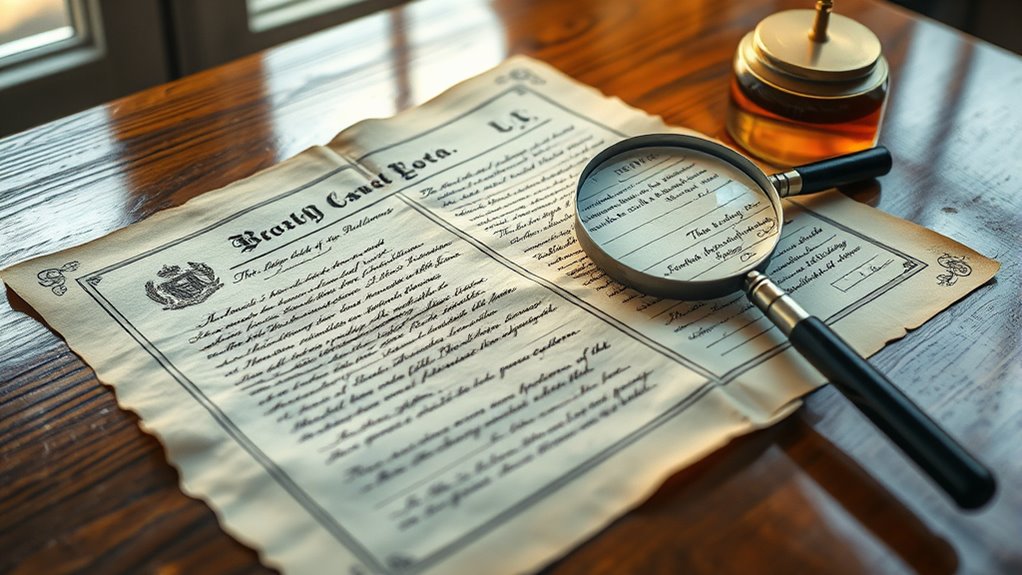Copyright termination and reversion rights let you reclaim or revoke rights to your work after a certain period or under specific conditions, giving you control over your creative projects. Usually, laws give you a window—like 35 years—to undo transfers or licensing agreements made years earlier. These rights help protect your moral interests and ensure your work stays true to your original vision. If you’re curious about how this might apply, there’s more to uncover below.
Key Takeaways
- Copyright termination allows creators or heirs to reclaim rights after a set period, often within 35 years of transfer.
- Reversion rights are triggered by contractual or legal conditions, enabling rights recovery when specific criteria are met.
- These rights help protect moral interests and preserve the creator’s original intent over time.
- Fair use and moral rights remain applicable, ensuring ongoing control and attribution even after rights reversion.
- Managing termination and reversion supports creators’ control, legacy preservation, and effective rights management.

Understanding copyright termination and reversion rights is essential for creators and rights holders alike. When you create original work, such as music, literature, or visual art, you might assume that copyright protections last forever. However, the law provides mechanisms to reclaim rights that were previously transferred or licensed, especially through termination and reversion rights. These rights allow you to regain control over your work after a certain period, which can be crucial for maintaining your moral rights and making sure your work continues to reflect your original intent.
Copyright termination generally refers to the legal process that enables authors or their heirs to revoke or cancel transfers of copyright interests, typically those made decades earlier. This process is governed by specific rules, such as those in the Copyright Act, which set time limits for exercising these rights—often within a 35-year window from the date of transfer. By understanding these rules, you can plan to reassert your rights before the window closes, especially if the work has gained recognition or value over time. Reversion rights, on the other hand, often apply in situations where rights were granted to publishers or other entities under licensing agreements. These rights allow you to recover your rights once certain conditions are met, such as the expiration of the license term or the fulfillment of specific contractual clauses.
Copyright termination and reversion rights allow creators to reclaim their works after specific periods, ensuring ongoing control and moral rights preservation.
It’s also important to think about how fair use and moral rights intersect with these processes. Fair use provides a limited exception to copyright, allowing you to use parts of copyrighted work for purposes like criticism, commentary, or education without needing permission. Recognizing your fair use rights is vital when managing your work’s future, especially if someone else’s use might infringe on your moral rights—the personal and reputational rights that protect your connection to your work. Moral rights, which include the right to attribution and the right to integrity, remain with you even if copyright is transferred or terminated, underscoring the importance of understanding how reversion rights can help preserve your moral rights long-term. Additionally, awareness of the specific legal frameworks can help you better navigate the challenges related to content licensing and rights management.
In essence, mastering the nuances of copyright termination and reversion rights empowers you to regain control over your work when it’s most beneficial. Knowing when and how to exercise these rights ensures your moral rights are respected and that your creative legacy remains aligned with your vision. Whether you’re steering through the legal landscape for the first time or managing a portfolio of works, understanding these rights helps you protect your rights, your reputation, and your creative integrity in a constantly evolving legal environment.
Frequently Asked Questions
Can Copyright Termination Be Contested in Court?
Yes, you can contest copyright termination in court if you believe there’s been a termination challenge or legal contestation against your rights. You must file within specific timeframes and follow legal procedures, providing evidence that supports your case. Courts review these disputes carefully to ensure adherence to copyright laws. If you’re unsure, consulting an attorney experienced in copyright law can help you navigate the legal contestation process effectively.
How Do International Copyright Laws Affect Reversion Rights?
International copyright laws influence reversion rights through treaties like the Berne Convention, which set standards for copyright protection worldwide. You need to contemplate how international treaties facilitate cross-border enforcement, ensuring your reversion rights are recognized beyond your country. However, enforcement varies by jurisdiction, so you must understand specific national laws. These treaties help protect your rights globally, but local legal systems ultimately determine how effectively you can assert reversion rights internationally.
What Happens if a Work Is Transferred After Termination?
When a work is transferred after a termination, the reversion rights may still apply if the transfer didn’t specify otherwise. Work transfer can complicate reversion procedures, but generally, if the original copyright owner exercises their reversion rights, they can regain control, regardless of subsequent transfers. Keep in mind that the specifics depend on the transfer’s terms and applicable laws, so always review the licensing agreements closely.
Are There Differences in Reversion Rights for Different Types of Works?
Yes, reversion rights vary depending on work classifications, affecting how reversion procedures apply. For example, works created for hire typically don’t revert, while individual works or works made for non-profit organizations often have clearer reversion pathways. You should carefully review the specific reversion procedures for each work type, as they differ regarding timing, notice requirements, and eligibility, ensuring you understand your rights to regain control.
How Do Licensing Agreements Impact Termination and Reversion Rights?
Think of licensing agreements as a delicate dance, where exclusive licensing tightens your grip, but termination rights can loosen it unexpectedly. When you sign, you might limit reversion rights, making it harder to regain control later. During royalty negotiations, be cautious—these terms can lock in restrictions that impact your ability to reclaim works. Always clarify how licensing agreements influence your reversion rights before you step onto the dance floor.
Conclusion
Understanding copyright terminations and reversion rights helps you protect your creative work and regain control when needed. Did you know that since the 1976 Copyright Act, over 2,000 works have been successfully reclaimed by their creators through termination rights? This highlights how vital knowing your rights is for artists and authors alike. By staying informed, you guarantee your rights are preserved and your creations remain yours. Don’t overlook these legal tools—they’re indispensable for safeguarding your work’s future.









